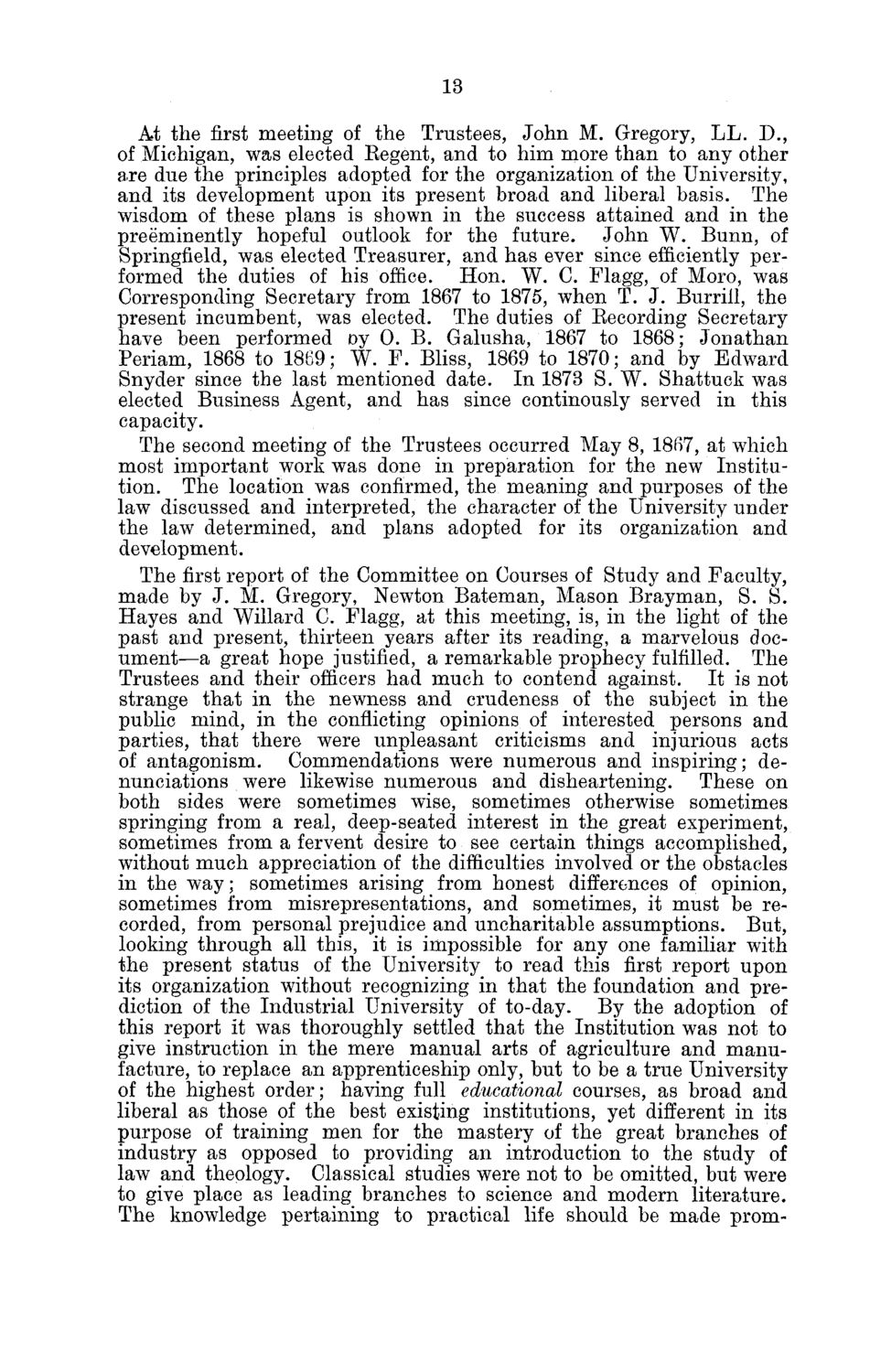| |
| |
Caption: Board of Trustees Minutes - 1880
This is a reduced-resolution page image for fast online browsing.

EXTRACTED TEXT FROM PAGE:
13 At the first meeting of the Trustees, John M. Gregory, LL. D., of Michigan, was elected Eegent, and to him more than to any other are due the principles adopted for the organization of the University, and its development upon its present broad and liberal basis. The wisdom of these plans is shown in the success attained and in the preeminently hopeful outlook for the future. John W. Bunn, of Springfield, was elected Treasurer, and has ever since efficiently performed the duties of his office. Hon. W. C. Flagg, of Moro, was Corresponding Secretary from 1867 to 1875, when T. J. Burrill, the present incumbent, was elected. The duties of Kecording Secretary have been performed oy 0. B. Galusha, 1867 to 1868; Jonathan Periam, 1868 to 1869; W. F . Bliss, 1869 to 1870; and by Edward Snyder since the last mentioned date. In 1873 S. W. Shattuck was elected Business Agent, and has since continously served in this capacity. The second meeting of the Trustees occurred May 8, 1867, at which most important work was done in preparation for the new Institution. The location was confirmed, the meaning and purposes of the law discussed and interpreted, the character of the University under the law determined, and plans adopted for its organization and development. The first report of the Committee on Courses of Study and Faculty, made by J. M. Gregory, Newton Bateman, Mason Brayman, S. S. Hayes and Willard C. Flagg, at this meeting, is, in the light of the past and present, thirteen years after its reading, a marvelous document—a great hope justified, a remarkable prophecy fulfilled. The Trustees and their officers had much to contend against. It is not strange that in the newness and crudeness of the subject in the public mind, in the conflicting opinions of interested persons and parties, that there were unpleasant criticisms and injurious acts of antagonism. Commendations were numerous and inspiring; denunciations were likewise numerous and disheartening. These on both sides were sometimes wise, sometimes otherwise sometimes springing from a real, deep-seated interest in the great experiment, sometimes from a fervent desire to see certain things accomplished, without much appreciation of the difficulties involved or the obstacles in the way; sometimes arising from honest differences of opinion, sometimes from misrepresentations, and sometimes, it must be recorded, from personal prejudice and uncharitable assumptions. But, looking through all this, it is impossible for any one familiar with the present status of the University to read this first report upon its organization without recognizing in that the foundation and prediction of the Industrial University of to-day. By the adoption of this report it was thoroughly settled that the Institution was not to give instruction in the mere manual arts of agriculture and manufacture, to replace an apprenticeship only, but to be a true University of the highest order; having full educational courses, as broad and liberal as those of the best existing institutions, yet different in its purpose of training men for the mastery of the great branches of industry as opposed to providing an introduction to the study of law and theology. Classical studies were not to be omitted, but were to give place as leading branches to science and modern literature. The knowledge pertaining to practical life should be made prom-
| |